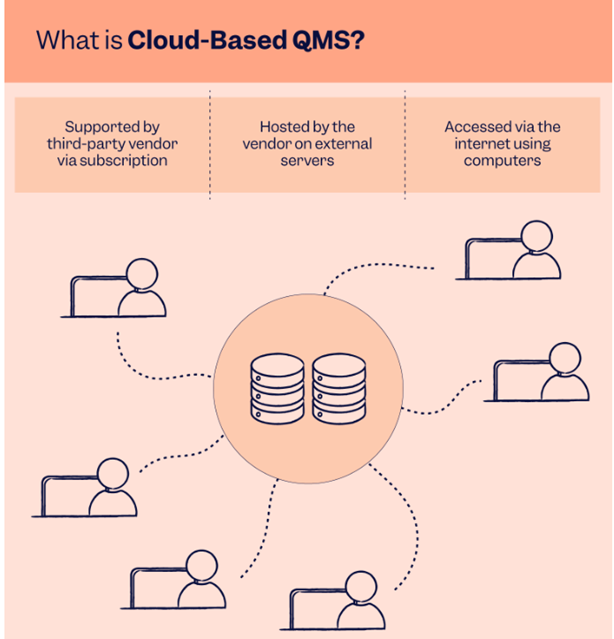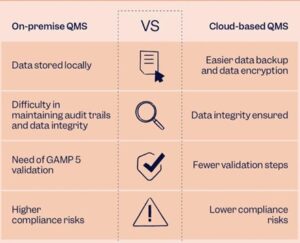Enhancing Efficiency with Cloud-Based QMS Software: Benefits and Best Practices for 2024

Introduction
Organizations consistently strive for ways that ensure higher adherence to standards and improve operational efficiency. Lately, the adoption of cloud-based quality management systems and software has been gaining popularity. It is one of the latest techniques to add to the quality management system deployed by businesses.
This blog delves into what exactly is a cloud-based quality management system software as opposed to traditional QMS software and much more.
What is Cloud-Based Quality Management System Software?
A cloud-based quality management system is a system in which data is saved remotely on a third-party platform. Therefore, it is this third-party platform or a vendor that is responsible for maintaining the integrity of your data. To make accessibility to data easier and to ensure compliance to rules and regulations, organizations have started turning to cloud-based quality management systems software.
What is Quality Management System? How is it different from Cloud Based QMS?
A quality management system (QMS) records procedures, and processes and fulfills requirements to meet quality standards and goals. A QMS software ensures customer requirements and regulatory standards by documenting quality tasks. An effective QMS with proper quality management software identifies and addresses problems, measures impacts and improves systems, requiring agility and adaptability for employees.

Best Practices for Implementing Cloud-Based QMS Software
To make the most out of cloud-based QMS software, consider the following factors:
-
Planning and Requirement Analysis:
Conducting a comprehensive analysis of your company’s requirements is a must before implementing any cloud-based QMS software. Identify the processes and understand if the features of the software align with your business objectives.
-
Selecting the Right Vendor:
An experienced vendor with a successful track record in the industry must be chosen when selecting a cloud-based QMS system. The vendor must offer features like customer support, frame proper security protocols and give options like scalability.
-
Level of Data Security:
Ensure that whichever cloud-based QMS software you select, complies with industry regulations and relevant standards. The software must provide data encryption, regular security updates and certifications to safeguard sensitive data saved.
-
Employee Training and Customer Feedback
Make sure that your employees are trained to use the software properly so that the company can leverage the advantages of this software. They must know how to get the best feedback from customers, identify pain points and consistently review system performance.
Benefits of Cloud-Based QMS System
Here are 8 main benefits of having cloud-based QMS system on board to improve your businesses in 2024:
-
Data-Based Informed Decision
By offering access to data in real time, decision-making becomes an easier process. It centralizes quality management information and enables stakeholders to make accurate and informed decisions. With a cloud-based QMS software, actionable reports and dashboards can be easily generated, strategic planning can be facilitated and operational improvement can also be done.
-
Faster Implementation
Cloud-based QMS software offers rapid deployment as opposed to traditional on-premise systems. There is no need for any hardware installations or IT configurations to have cloud-based QMS software. An organization can avail of the benefits of such software immediately and start optimizing its quality management practices.
-
Better Data Visibility
By saving data in a cloud-accessible location, users gain better access to data owing to the centralized system. Cloud-based quality management system software ensures transparency, improves collaboration among employees and reduces errors caused by data silos.
-
Higher Data Security
Superior data security to protect confidential information through encryption, multi-factor authentication and regular security audits can be easily done by a quality management system software. Automatic backups and the ability to recover obsolete data are other added advantages which an organization with this system can avail.
-
Inherently Scalable
A good cloud-based quality management system scales organically with an organization. Increasing storage, adding new functionalities and enhancing the processing power can be added without making any significant changes to the infrastructure. It is a cost-effective way to find flexible solutions to organizational problems.
-
Better Data Security
Data is safer in the cloud where providers implement rigorous, proactive safeguards and consistent monitoring to reduce disruptions. Private cloud models offer the highest security and flexibility. Therefore, when selecting a software for your company, companies must consider:
- Recovery Time Objective (Aims at the resumption of activity within 5 minutes.)
- Recovery Point Objective (Refers to the degree of losses a business or a company can sustain. A period of 15 minutes is considered as the worst-case scenario.)
-
Full-Time Customer Support Services
As opposed to on-site QMS which demands significant management of hardware and software, a cloud-based quality management system vendor offers managed services. It also offers full-time dedicated customer support faculty cutting down on time wastage and unnecessary energy consumed. Operational costs come down dramatically and there is no need for internal IT administration.
-
Cost-Effective and Budget-Friendly:
On-site solutions incur maintenance expenses, include capital investments, require network infrastructure and expenditure on staff for hardware. However, a cloud QMS software does not need any of it as the provider assumes responsibility for hardware and its maintenance. The only expenditure to be incurred by a company is limited to subscription fees.
Conclusion
Cloud-based quality management software is more a practical option for businesses, ensures efficient streamlining of documents and is more result-oriented. It comes with a lower ownership cost and helps a company to adhere to rules and regulations more effectively. As a business or a company continues to navigate in an evolving market, a cloud-based quality management software is vital for fostering innovation, achieving long-term success and operational excellence.
Frequently Asked Questions
- What is the future of the Quality Management System?
Blockchain technology is the next big thing in domain quality management. It ensures better transparency, and improved data integrity, reduces counterfeiting risks and allows better trust for products among consumers.
- What is the latest version of standards under the Quality Management System?
ISO 90001:2015 is the latest protocol version available under ISO 9001. The International Organisation for Standardisation has specified 7 principles of quality management, namely, a customer-centric approach, strong leadership, employee engagement, approach to the process, consistent improvement, evidence-based decision making and relationship management.
- What are the 3 main advantages of cloud quality management software systems?
The main advantages of cloud quality management software systems are saving of time, avoiding any unnecessary costs, better quality and an increase in agility.




